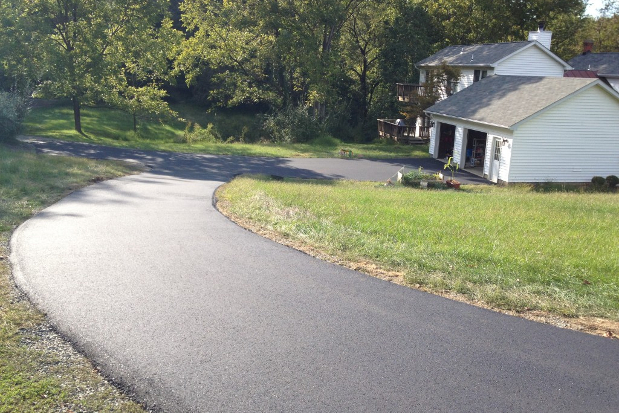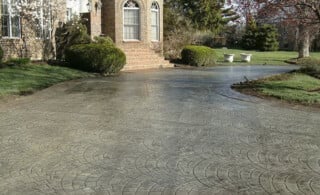
Driveway sealing is an easy and cost effective way to protect and prolong the life of your driveway. Asphalt surfaces are particularly susceptible to wear and tear, both from weather and from automobile traffic, and the grade of asphalt commonly used on driveways is even more so. Driveway sealing at regular intervals gives your driveway the added protection it needs to last longer and resist deterioration.
Needs Regular Upkeep
If you’re not sure on this point, consider the constant upkeep the asphalt roads in your community need in order to stay in good shape. Add to that the fact that the asphalt used on roads is generally a higher grade and made to withstand a higher level of abuse than the asphalt typically used in driveway applications, and you can see why it’s important to keep up on regular maintenance, including asphalt sealing, in order to fend off major projects such as repaving a crumbling asphalt surface.
The Benefits
Sealing your driveway has many benefits when it comes to preserving your concrete driveway. First and foremost, a properly applied driveway sealer repels water, perhaps the single most harmful agent when it comes to deteriorating asphalt surfaces. Concrete has a natural tendency to crack if water is allowed to permeate it, and this tendency is only increased by the weight of cars regularly driving over it. Once those cracks appear, water further damages it, especially in cold climates where it expands and contracts with freezing temperatures.
Other enemies of your driveway include sunlight and oxygen, both of which hasten corrosion. By regularly applying a quality driveway sealer to your concrete you can prevent water, sunlight, and air from permeating your asphalt and prevent these problems. As an added benefit, driveway sealing also repels oil spills and leaks and makes it much easier for you to sweep and clean your driveway surface.
When to Apply
As a general rule you should seal your driveway every 1 to 3 years. More specifically, if you can see the color of the individual stones that make up your asphalt surface, you know it’s time to seal it up. A few rules apply before you seal, however. For starters, never seal a new asphalt driveway. Asphalt needs a minimum of six months for the oils in it to evaporate. The less oil, the harder the driveway, which is the goal. If you apply driveway sealer before your asphalt has time to cure, it won’t achieve the necessary hardness and all your work will be for naught. Other things to consider are the outside temperature, which must be fifty degrees or higher for the sealer to adhere properly, and the weather. Ideally you want your sealer to be on your driveway for at least 48 hours before any rain comes down on it.
Ready to start your Asphalt Sealing?
Find ProsTalk to a Professional
Driveway sealing is an important aspect of asphalt driveway maintenance, however it’s not the only thing you need to keep up on. If your driveway has pre-existing cracks, potholes or other signs of wear, it’s vital that you fix those problems before you apply a sealant. That being the case, your best bet is to contact a professional that won’t only apply your sealant, but who will also evaluate your driveway for other maintenance needs that need to be addressed before you perform this necessary task.
 About Heated Driveways
About Heated Driveways  Concrete Resurfacing – Process & Options
Concrete Resurfacing – Process & Options  Asphalt Paving
Asphalt Paving  Pouring a Concrete Driveway or Walkway
Pouring a Concrete Driveway or Walkway  Green Driveways, Patios, Walkways, & Floors
Green Driveways, Patios, Walkways, & Floors 

Level driveway need sealant (820 sq. ft.) Ready to go!
I didn’t realize that the asphalt used on driveways was of lower quality than that of roads. Mine has been looking a little weather-worn lately. I’ll have to find someone to come and put a sealcoat on my asphalt driveway.
Just had a new asphalt driveway put in should I seal it now or next year ?
Is it necessary to seal my asphalt driveway?
Is it necessary to seal my asphalt driveway just put it in
Asphalt used in driveways is not a lower grade than what is on the roads. There are many different types of specs for asphalt mixes. The difference between a road and driveway is the depth and number of layers that are needed to handle amount of traffic that roads get.
Sealcoat is actually detrimental to asphalt, keep in mind that any petroleum product is corrosive to asphalt. Seal coat is a petroleum based product. Seal coat is much more economical to apply, so large parking lots, can be seal coated to avoid the large expense of resurfacing.
The only reason to use seal coat is if you simplu want your aspahlt to be black or if you are trying to get a few years extra out of your driveway before resurfacing it.
Once you pave your driveway you should wait a minimum of 3 years before considering to seal coat.
Just moved into an older home with asphalt drive. It is in good condition but black is getting on my children’s feet, shoes and clothes. Is this normal or does it need to be sealed to prevent this from happening.
Thank you
Most driveways will have at least a few cracks, which must be repaired before you apply an asphalt sealer. It’s important to repair all cracks, even the smallest ones. If you don’t, they’ll only grow wider and longer over time.